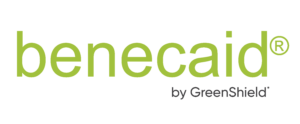Group insurance, quite simply, is insurance coverage of multiple people (e.g. an organization’s employees) under a single contract. If you’re an employer looking at employee benefits for the first time, there is often some uncertainty as to what group insurance actually entails. If you’re a benefits advisor with clients looking to purchase employee benefits, we hope that being able to provide those clients with these definitions will help them better navigate the insurance industry lingo!
Below is an overview of the different types of group insurance available to protect an organization’s employees and their dependants.
Extended Health Care (EHC)
Extended Health Care (EHC) is most often the first thing that comes to mind when thinking of group insurance, and the most well known aspect of group insurance offerings. All organizations who have employee insurance in place have at minimum some version of Extended Health Care coverage.
Prescription Drug Insurance
- Covers the cost or partial cost of prescribed prescription drugs
Paramedical Coverage
Common paramedical expenses covered include:
- Acupuncturist
- Audiologist
- Chiropractor
- Chiropodist/Podiatrist
- Dietician
- Naturopath
- Occupational Therapist
- Physiotherapist
- Psychologist/Psychotherapy/Social Worker
- Registered Massage Therapist
- Speech Pathologist
Vision Insurance
Vision insurance may cover the cost or partial cost of expenses such as:
- Eye exams
- Prescription eyeglasses and contact lenses
- Corrective laser eye surgery
Travel Insurance
For emergency medical expenses incurred when an employee is travelling outside of their province of residence. Coverage varies but can include:
- Emergency hospitalization, medical and paramedical expenses
- Trip cancellation
- Repatriation
- Flight accident
- Coverage for up to 60 days
Click here for a full list of travel expenses commonly covered by Benecaid.
Medical Care Expenses
Extended Health Care covers the cost (or partial cost) of employees’ medical care and hospital-related expenses, such as:
- Medical supplies & equipment
- Accidental dental
- Ambulance
- Semi-private hospital
- Diagnostic services
- Private duty nursing
- Home care
- Hearing aids
All of Benecaid’s plans can be designed to fit a company’s budget and anticipated usage by customizing maximums, variable co-insurance amounts, and procedure frequencies.
Dental Insurance
Along with Extended Health Care, Dental is a category of group insurance that all employers who offer employee insurance provide. In many businesses, it often sees one of the highest usage rates.
Dental Plans can include:
- Annual checkups
- Teeth cleaning & polishing
- Major services including periodontics, crowns, onlays and bridges
- Orthodontics
- Denture services
Click here for additional examples of dental expenses commonly covered by Benecaid plans.
Life Insurance
Life insurance provides peace of mind for your employees by providing financial support for their loved ones in the event of death. While many employees and job seekers have come to expect Extended Health Care and Dental coverage with their employee benefits, life insurance coverage helps show that a company cares about their employees and their families’ wellbeing, and helps to attract and retain top talent for your business.
Accidental Death & Dismemberment
Another category of group insurance that employers may run into is Accidental Death & Dismemberment (AD&D). AD&D provides employees or their beneficiaries additional financial support in the event of:
- Death by accidental means
- Loss of sight, hearing or speech
- The accidental dismemberment of part or all of a limb (i.e. hands, feet, arms, legs, fingers or toes)
AD&D differs from Life Insurance in that Life Insurance covers death from both natural causes and accidental causes, whereas AD&D covers death from accidental causes and severe injury to limbs.
Disability Insurance
Short Term Disability (STD) Insurance and Long Term Disability (LTD) Insurance cover your employees in the event of becoming disabled. This may include an extended illness, mental health issues, and/or injury.
Short Term Disability, as the name implies, covers a portion of an employee’s income for a short period of time – generally between 15 to 26 weeks – while they are unable to work.
Long Term Disability spans for a longer period of time for disabilities lasting over 16 weeks.
Disability insurance is intended to replace lost income for disabled employees and is paid out to plan members on a regular basis, e.g. weekly, bi-weekly, etc.
Critical Illness Insurance
Critical Illness provides one lump-sum, non-taxable payment in the event of a covered life-threatening illness such as cancer, stroke, or heart attack. The payment can be used towards:
- Experimental drugs
- Out-of-province treatment
- Alternative treatment
- Nursing or home care
A benefits advisor will be able to work with you to determine which illnesses your business would like to cover under your group insurance plan.
Health Spending Accounts (HSAs)
Although not a form of group insurance itself, Health Spending Accounts (HSAs) are worth mentioning in this article because an HSA can be a unique alternative or addition to a traditional group insurance plan.
Health Spending Accounts are funded by the employer and allow employees to be reimbursed for a wide variety of health-related expenses, as defined by the Canadian Revenue Agency. In some cases, HSAs are desirable because they allow for more flexibility in their usage than insurance coverage.
To learn more about Health Spending Accounts, click here.
Group Insurance with Benecaid
Benecaid specializes in working with Benefits Advisors to create custom employee benefits packages for small and medium-sized businesses. Whether you are a first time buyer of group insurance or have an existing plan, Benecaid offers a plethora of options to customize for insurance options that will fit the needs, anticipated usage, and budget of your business.
Contact a Benecaid Consultant today at 1-877-797-7448 (toll-free) or email us at sales@benecaid.com to learn more.



Comments are closed.